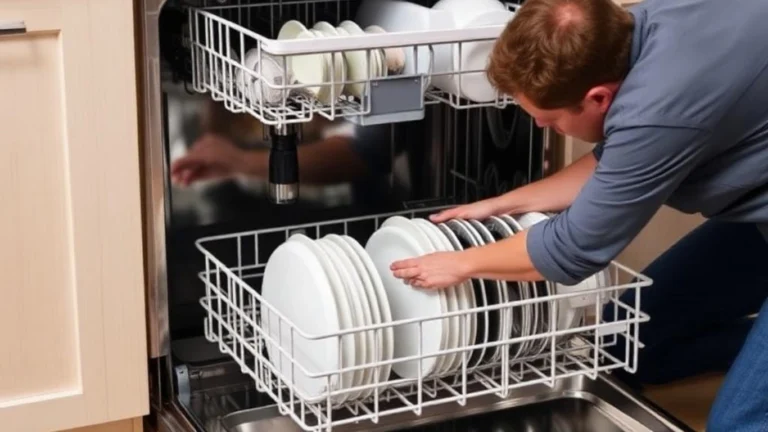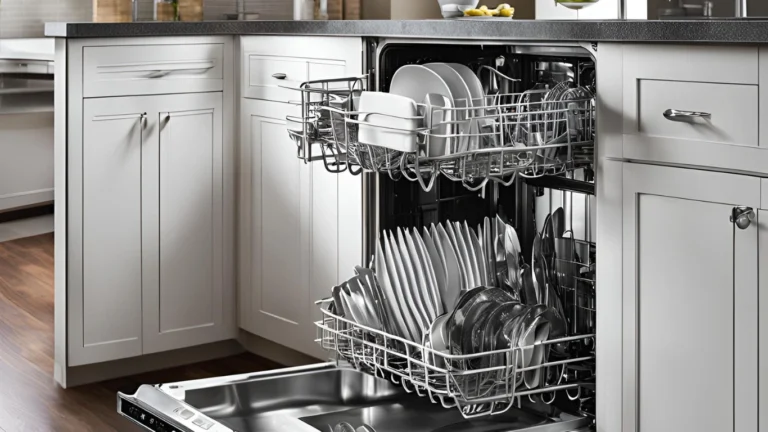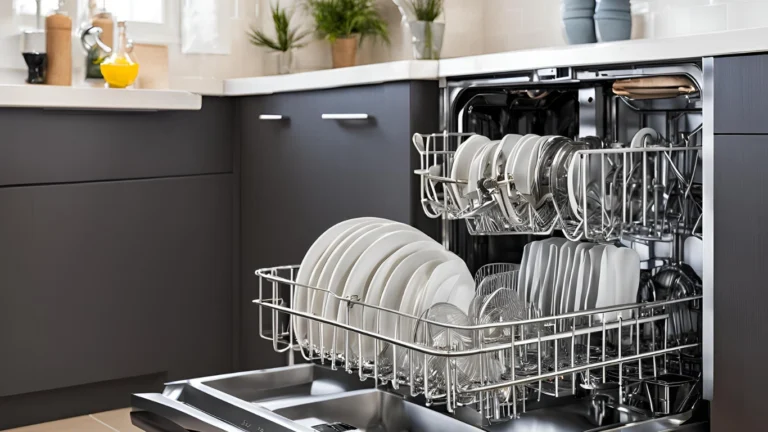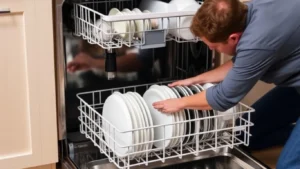Owning a dishwasher can be one of the most dependable appliances that the modern home has. All that time and water you can save, plus everyone appreciates everything coming out looking great after a wash cycle. What you may not have known is that when you clean your dishwasher, you also keep it running at an optimal level, which may not be it was gaining efficiency: greases, food bits, and mineral accumulations form in a dishwasher from each wash just like any other appliance, and your dishes may come out not as cleanly.
This cleaning and maintenance guide will help maximize your productivity by recognizing the importance of cleaning your dishwasher, then by showing you how to deeply clean it, and finally, what your dishwasher needs to maintain its performance.
Why Is It Important to Clean the Dishwasher?
Cleaning the dishwasher should not just be seen as personal tastes; It impacts the performance and life expectancy of the appliance. Here are four important reasons to make cleaning the dishwasher a regular habit:
1. Prevent Odors
Not cleaning the food scraps and grease inside your dishwasher can let unpleasant odors develop. Regular cleaning prevents odors and helps keep your kitchen smelling fresh.
2. Improve Efficiency in Cleaning
When your dishwasher is dirty, it is more difficult for the water and detergent to clean your dishes effectively. Clean spray arms, filters, and the interior will ensure that every load is clean.
3. Increase the Life of the Dishwasher
Not bothered to keep the dishwasher clean can lead to clogs, rust, and wear and tear on the components at a faster rate. Cleaning and maintenance will help lessen mechanical failure and prolong the life of your appliance, protecting its investment.
4. Save Energy and Water
Using a dishwasher that is clean will make it work more efficiently, allowing you to use less water and energy. In terms of money, this signifies lower utility bills, and in terms of the environment, this means a greener home.
Signs Your Dishwasher Needs a Wash
Wondering if a dishwasher is in need of some attention? Watch out for the following warning signs:
Dirty Dishes – Residue, streaks or food is left on plates when the dishwasher is done, not good!
Bad Smell – A bad, musty smell hanging around the kitchen could be food or grease caught somewhere in the dishwasher.
Water Left Over – Water sitting in the bottom of the dishwasher itself indicates a clog in the filter or main drain.
Residue Left on the Dishwasher – Look for grease, soap scum, or mineral build-up on the dishwasher’s walls, door, and filter.
Slow Draining – Water is draining slowly, indicating a clog or dirty filter as well.
If you’ve noticed any of the signs above in your dishwasher, it is time to get in there for proper wash.
What You Will Need
Before getting started, you will want to gather the following supplies to make things easier:
- Dish soap
- Distilled white vinegar
- Baking soda
- Soft sponge/microfiber cloth
- Old toothbrush
- Toothpicks/thin wire
- Gloves (optional)
- Bowls
- Dishwasher-safe descaling solution (optional)
Your Step-by-Step Guide to Cleaning the Dishwasher
Step 1: Empty the Dishwasher
Begin by taking out all of the dishes, utensils, and racking. Emptying your dishwasher allows you to have complete access to every cleaned surface.
Step 2: Clean the Filter
The filter is the part that collects food particles from your dishes so they do not get stuck in the drain. To clean the filter:
Locate the filter – look at the bottom of your dishwasher. Most filters unlock by twisting or popping off.
Rinse – clean the filter in warm running water and scrub gently with an old toothbrush to get anything stuck off.
Reinstall – double-check that you have the filter on snugly or if it has a lid, you close the lid tightly so that there are no issues operating the dishwasher.
Pro Tip: Clean your filter every month, if you run your dishwasher daily you may want to clean it out more often.
Step 3: Check and Clean the Spray Arms
The spray arms deliver water during cycles, but they can become clogged (the holes) with food debris or mineral deposits over time!
Remove the Spray Arms (if they can be removed) – Check your manual for instructions.
Unclog the Spray Arm Holes – Use a toothpick or thin wire and poke the food particles or mineral deposits clogging the spray holes.
Rinse the Spray Arms – Rinse the spray arms well with fresh water to remove debris, and then replace them.
Step 4: Wipe Down the Interior
Grime and grease will build up on the walls of your dishwasher over time. Here’s how to clean up after it!
Make a Cleaning Solution – Mix warm water and a few squirts of dish soap.
Wet and Scrub – Use a sponge or microfiber cloth and wipe down all the walls, corners, and the rubber seal that goes around the door. For stuck on grime, you can use an old toothbrush!
Step 5 : Use Vinegar for Mineral Deposits
Distilled white vinegar is great to use as a natural cleaner inside your dishwasher.
Vinegar on the Top Rack – Fill a bowl large enough to fit in the top rack, with 1-2 cups of distilled white vinegar (make sure it is dishwasher safe), and place it on the top rack.
Run a Hot Cycle – Start a cycle (without dishes or soap) which will loosen grease, grime, or mineral deposits.
Step 6: Refresh with Baking Soda
Baking soda is ideal for neutralizing odors and polishing the interior.
Sprinkle the Baking Soda – Take 1 cup of baking soda and sprinkle it around the dishwasher floor.
Run a Short Hot Cycle – This will deodorize your dishwasher and polish the surface.
Step 7 : Clean the Door Seal
The rubber gasket around the door can collect mold and debris.
Mild Soap and Water Wipe – Use a damp cloth or sponge and a mild soap and water mixture to clean the gasket.
Tackle Tough Areas – For tough grime, use an old toothbrush and warm soapy water to scrub it down gently.
Step 8 : Polish the Exterior
The rubber gasket around the door can collect mold and debris.
Stainless Steel Cleaner – Use a stainless steel cleaner, or mix water and vinegar to clean the surface.
Buff the Exterior – Buff out fingerprints and smudges with a microfiber cloth.
Tips for Deep Cleaning Your Dishwasher Quickly
It has been sometime since you last cleaned your dishwasher? Follow these additional steps to improve its performance:
Descaling – Use a descaler which is dishwasher-friendly, that can help eliminate hard water stains and limescale.
Sanitize – For extra cleanliness, complete a cycle with a dishwasher-safe sanitizer for disinfecting.
Clear the Drain – Clean out debris and build up located in the drain area to prevent standstill water flow.
Tips for Preventive Maintenance to Keep your Dishwasher Clean Long-Term
Generally, the following tips should help keep your dishwasher clean and running smoothly:
Scrape, don’t rinse – Dishwashers are built to handle small food particles! Use the scrape method, rather than wash.
Run hot water prior to starting – Run your sink’s hot water for about 30 seconds before starting the dishwasher.
Don’t overload – Don’t stuff your dishwasher overloads ). If you are cramming, food particles cannot get washed away by water.
Use the right detergent – Use the dispenser which comes with dishwasher detergent which.) which is designed for your water type.
Common Inquiries Regarding Your Dishwasher
How often should I clean my dishwasher?
You should be cleaning filters once a week, cleaning the interior once a month, and deep clean your dishwasher every 3-4 months.
Will vinegar ruin my dishwasher?
Most dishwashers are safe to use distilled white vinegar, but use caution as it can deteriorate rubber in seals over time.
Why does my dishwasher smell?
Unpleasant odors develop as a result of food debris and grease being trapped. If you clean your filter, drain, and interior regularly, you won’t have odors.
Is a baking soda dishwasher safe?
Yes! Baking soda is non toxic and will freshen and neutralize odors in your appliance.
Ensure that Your Dishwasher Performs at its Best
A clean dishwasher isn’t only a happy appliance; it also saves you money and energy, and is more sustainable for your home. If you follow the steps and tips below, you will have gleaming dishes every time you run your dishwasher, and your appliance will last as long as possible operating as well as possible. Make cleaning your dishwasher a practice, so you can enjoy the perks of an appliance that is fresh and working efficiently to do its job well!

















